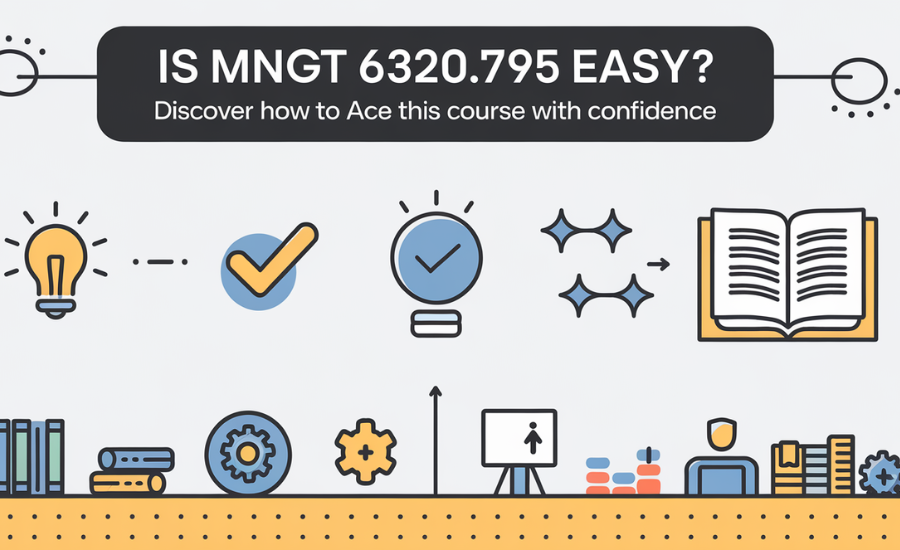
Is MNGT 6320.795 Easy? Navigating the Challenges of Advanced Management Strategies
MNGT 6320.795 is easy and essential course within many business curricula, designed to provide a deeper understanding of advanced management strategies. This course delves into the study of strategic management concepts and the processes involved in making informed business decisions. It also highlights the practical application of these management principles to address real-world business situations.
As industries continuously adapt and change, gaining expertise in these strategies becomes increasingly vital. The course equips students with critical analytical abilities, enabling them to solve intricate business problems. Through exposure to various management models and frameworks, students are well-prepared to apply these tools effectively in their future careers. A common question students often ask is, “How challenging is MNGT 6320.795?” This article explores student feedback and provides insights into the course’s challenges and the benefits it offers.
The Role of MNGT 6320.795 in Business Education Programs
MNGT 6320.795 holds a critical place in business degree programs, serving as a foundational course that equips students with the essential skills needed for leadership and management roles. In an increasingly globalized and competitive business environment, mastering effective management techniques is not just beneficial but necessary for success. This course provides a well-rounded education by combining theoretical frameworks with real-world applications, making it indispensable for those pursuing careers in management.
What makes MNGT 6320.795 particularly valuable is its dual focus. On one hand, it dives deep into strategic management theories, giving students a strong academic foundation. On the other, it offers practical tools and techniques that students can apply in everyday business situations. This combination ensures that students not only understand key concepts but can also implement them in dynamic, real-world settings, a skill set highly sought after in managerial roles across various sectors.
Additionally, the course enhances students’ ability to critically assess business challenges, craft effective strategies, and make informed decisions. By working through case studies, management models, and strategic frameworks, students develop strong analytical and problem-solving skills that are crucial for navigating complex business environments. These skills are transferable across industries, meaning that MNGT 6320.795 prepares students for a wide range of career opportunities, from corporate leadership roles to entrepreneurial ventures.
Given its importance, understanding the level of difficulty of MNGT 6320.795 is key for students planning their academic journey. While the course presents challenges, especially in terms of applying complex theories to practical situations, it also offers substantial rewards. Mastering the content of this course not only boosts a student’s academic profile but also enhances their preparedness for the demands of the business world, positioning them for success in their future careers.
Course Structure and Objectives of MNGT 6320.795

MNGT 6320.795 is designed to provide students with a deep and well-rounded understanding of management theories and practices. The course’s primary objective is to develop students’ ability to think strategically, a critical skill for navigating complex business environments. By focusing on strategic analysis, students learn to evaluate intricate business scenarios, identify challenges, and devise effective solutions. This analytical approach helps students build the problem-solving capabilities that are essential in managerial roles.
A significant goal of the course is to enhance decision-making skills. Through exposure to a variety of management models and leadership styles, students gain valuable insights into how different approaches can be applied to various business situations. This knowledge is vital for future managers who will need to adapt their leadership styles to meet the diverse needs of their teams and organizations. Additionally, the course emphasizes teamwork and collaboration through group projects, which simulate the dynamics of real-world business settings. These group activities not only reinforce the theoretical aspects of the course but also help students develop essential interpersonal and leadership skills.
Key Topics Covered
MNGT 6320.795 offers a comprehensive curriculum that covers a wide range of management topics, providing students with a thorough understanding of both classical and modern management practices. The course begins by introducing foundational management theories, from classical approaches to contemporary strategies that reflect today’s rapidly changing business environment. Students explore various leadership styles, examining how different approaches can shape organizational culture and influence team performance.
In addition to leadership, strategic planning is a central focus of the course. Students learn to set long-term organizational goals, assess market conditions, and develop actionable strategies that align with a company’s vision. Real-world case studies are used throughout the course to illustrate how these theories and models are applied in practice, offering students a tangible understanding of how strategic planning impacts business outcomes.
The course also covers essential topics such as change management, where students learn how to guide organizations through periods of transformation, and performance measurement, which helps students understand how to evaluate and improve business operations. By exploring these diverse subjects, MNGT 6320.795 equips students with the knowledge and tools needed to succeed in managerial roles across a wide range of industries.
Assessment Methods
The assessment methods in MNGT 6320.795 are designed to ensure that students not only understand the material but can apply it effectively in various contexts. The course uses a combination of quizzes, exams, and group projects to measure student progress and engagement. Quizzes are often administered weekly to reinforce key concepts and ensure that students are keeping up with the course material. These quizzes help to solidify students’ understanding of management theories and practices, while also encouraging consistent study habits.
Group projects play a particularly important role in the course’s assessment structure, reflecting the collaborative nature of modern business environments. These projects typically require students to analyze a company or industry, applying the management models and strategies they’ve learned to real-world situations. By working together, students develop critical teamwork and leadership skills that are invaluable in professional settings. Additionally, reflective essays may be included in the assessment process, allowing students to critically examine their learning experiences and articulate how the course has impacted their understanding of management.
Student Experience in MNGT 6320.795: Insights and Perspectives
Student experiences in MNGT 6320.795 vary significantly, offering a broad range of feedback that reflects the unique challenges and rewards of the course. Many students highlight the engaging teaching styles and supportive academic environment, which play a crucial role in making the course more approachable. For example, one student shared, “The instructors were always approachable and willing to help, which made the complex material much easier to grasp.” This sentiment underscores the positive impact that accessible professors and well-structured lessons can have on the overall learning experience.
However, not all students find the course equally straightforward. Some point to the demanding nature of the coursework, with one student explaining, “While the subject matter was incredibly interesting, the sheer volume of readings and the number of projects could feel overwhelming at times.” This highlights the fact that, although the course content is intellectually stimulating, the workload can be challenging for students who may need to balance other academic or personal commitments. Therefore, the perception of difficulty in MNGT 6320.795 often depends on individual study habits, time management, and personal engagement with the material.
Class Environment and Its Impact on Learning
The class environment of MNGT 6320.795 plays a significant role in shaping students’ experiences. Many students report that the collaborative nature of the classroom fosters a positive learning atmosphere. Professors often employ a variety of teaching methods, such as group discussions, case studies, and interactive projects, to encourage student participation and enhance understanding of complex management theories. This interactive approach makes the course material more relatable and accessible, helping students apply theoretical knowledge to practical scenarios.
Additionally, the diversity of the student body contributes to enriching the overall learning experience. Students come from different professional backgrounds, bringing various perspectives to the discussion of management concepts. This diversity promotes dynamic classroom conversations, where students can learn not only from the instructors but also from their peers’ experiences in different industries and organizational settings. These exchanges broaden the scope of learning, making the course more engaging and applicable to real-world situations.
Ultimately, the class environment in MNGT 6320.795 significantly influences whether students perceive the course as easy or challenging. A collaborative and supportive setting, where students feel comfortable asking questions and sharing ideas, often leads to better learning outcomes and a more positive course experience. This underscores the importance of active participation and creating a learning environment that encourages open dialogue and mutual support.
Analyzing the Difficulty Level of MNGT 6320.795
The difficulty of MNGT 6320.795 largely depends on individual factors such as background knowledge, learning preferences, and study habits. For many students, the course is considered manageable and even enjoyable when they actively engage with the material. The structured layout of the course, along with support from faculty, creates a learning environment that can facilitate success for those who are well-prepared and committed to staying on top of their work. One student noted that the engaging format and availability of professors made the course more accessible, especially when tackling complex subjects.
However, students who struggle with time management or who are unfamiliar with the theoretical and practical components of the course may find it more challenging. The course requires a significant investment of time, as it covers a blend of strategic management theories and their real-world applications. Those who fall behind on assignments or neglect to fully engage with the coursework may feel overwhelmed. Therefore, while some students may breeze through MNGT 6320.795 with ease, others may require additional effort and support to keep up with the demands. Ultimately, how easy or difficult the course is depends on each student’s approach and commitment to the material.
Key Factors Contributing to Course Difficulty

Several factors influence how challenging students may find MNGT 6320.795. One of the primary contributors is the course workload. With multiple assignments, case studies, and projects occurring concurrently, time management becomes crucial. Students who are juggling other responsibilities or have difficulty organizing their schedules may struggle to keep up. The volume of work can feel overwhelming for those who do not plan their study time effectively.
Another factor is the complexity of the material itself. Topics like strategic planning, organizational behavior, and leadership models require a deep level of critical thinking and analysis. Students with limited prior exposure to management theories or those new to these concepts might find it difficult to fully grasp the material. The course also emphasizes the application of theory to real-world business challenges, which demands a strong understanding of both abstract and practical elements.
Group projects, while designed to mirror real-world business collaboration, can also introduce additional challenges. Effective teamwork is essential, and managing group dynamics can sometimes be difficult, especially when students have different work habits or communication styles. Navigating these complexities requires not only knowledge of the course content but also strong interpersonal and leadership skills. Recognizing these factors in advance can help students better prepare and develop strategies to overcome potential challenges, leading to a more rewarding experience in the course.
Study Strategies for Success in MNGT 6320.795
Adopting Effective Study Techniques
To excel in MNGT 6320.795, implementing well-planned study techniques is essential. One effective approach is to establish a structured study routine. By setting aside specific times for reading, working on assignments, and preparing for exams, students can manage the course’s demanding workload more efficiently. A planned schedule helps prevent last-minute cramming and promotes better time management.
Active learning techniques also play a significant role in reinforcing material. Instead of passively reading, students can benefit from summarizing course content in their own words, which aids retention. Engaging in discussions with peers about complex topics deepens understanding and allows for diverse perspectives on management theories and practices. Another powerful tool is forming study groups, where students can exchange ideas and tackle challenging concepts together. These strategies encourage a more interactive and thoughtful approach to studying, enhancing long-term retention of the material.
Leveraging Available Resources
MNGT 6320.795 provides a wealth of resources designed to support student learning, and taking full advantage of them is crucial for success. Students have access to a wide range of materials, including textbooks, academic articles, and online databases that offer deeper insights into management concepts. Reviewing these resources regularly helps clarify difficult topics and provides additional context to the theoretical frameworks covered in the course.
Beyond course materials, many universities offer tutoring services and writing support to assist students, especially with complex assignments. Seeking help from tutors or writing centers can greatly improve the quality of essays, reports, and projects. Additionally, online forums and discussion platforms focused on management studies can serve as valuable spaces for students to ask questions, share their insights, and learn from the experiences of others. These external resources, combined with course-specific materials, contribute to a more comprehensive learning experience.
The Benefits of Group Study
Group study sessions provide a collaborative environment that can make MNGT 6320.795 more manageable and engaging. Working with classmates offers several advantages, including the opportunity to share insights and tackle difficult topics together. Discussions within a group allow students to explain and debate various concepts, which can clarify complex material and deepen understanding.
Another key benefit of group study is its ability to reduce the pressure associated with the course. When working on group projects, students can divide responsibilities, making the workload more manageable for everyone involved. For example, research tasks or sections of a group presentation can be split among members, ensuring that each person contributes while benefiting from collective efforts. Furthermore, studying with others fosters accountability, as group members motivate each other to stay focused and meet deadlines. This shared responsibility can lead to a more productive and enjoyable study experience.
Adopting effective study techniques, utilizing available resources, and engaging in group study sessions are all critical strategies for succeeding in MNGT 6320.795. These approaches not only improve comprehension and retention of course material but also help students manage the course’s demands more effectively, leading to a more rewarding educational experience.
Comparing MNGT 6320.795 to Other Management Courses
When comparing MNGT 6320.795 to similar management courses, several unique features distinguish it. Unlike many courses that focus on specific areas like marketing or finance, MNGT 6320.795 offers a comprehensive blend of both theoretical knowledge and practical application across a broad spectrum of management principles. This course provides a more holistic approach to understanding the complexities of management, offering a wider range of topics, including strategic thinking, leadership, and organizational behavior.
A standout feature of MNGT 6320.795 is its emphasis on developing strategic thinking skills. Many management programs may concentrate on specialized skills, but MNGT 6320.795 equips students with the ability to think critically across various business functions. This approach enables students to analyze diverse business scenarios, which is a valuable asset in today’s complex work environment. While this broader scope provides excellent preparation for real-world business challenges, some students may find the range of topics covered more demanding compared to courses with a narrower focus.
Reasons to Choose MNGT 6320.795
MNGT 6320.795 offers several advantages that make it a compelling choice for students pursuing management studies. One of the key benefits is the course’s ability to bridge the gap between theory and practice. Students are not only introduced to important management concepts but also have the opportunity to apply them in real-world situations. This practical application is facilitated through case studies and group projects, where students can test their knowledge in simulated business environments.
Another reason to consider MNGT 6320.795 is its dynamic and diverse teaching methods. Faculty members use a range of instructional approaches, including interactive discussions, collaborative group work, and practical assignments, all of which enhance the learning experience. These teaching techniques not only foster a deeper understanding of the material but also prepare students for the teamwork and problem-solving they will encounter in the workforce.
Furthermore, the collaborative nature of the course allows students to build valuable networking connections with peers and instructors. This interaction provides students with opportunities to share different perspectives and experiences, enriching their learning and helping them develop essential interpersonal skills.
Instructor Expertise and Its Impact on Learning
The qualifications of the faculty teaching MNGT 6320.795 play a pivotal role in shaping the overall student experience. Instructors often come with a strong blend of academic credentials and hands-on industry experience, making their expertise highly relevant. Most faculty members possess advanced degrees in management and related fields, along with extensive experience in leadership or strategic roles within the business world. This combination ensures that students benefit from both theoretical foundations and practical insights that are directly applicable to real-world management challenges.
Moreover, many of the instructors are actively engaged in research, particularly in areas related to modern management practices. This involvement in cutting-edge research keeps the course content up to date, ensuring that students learn about the latest trends and techniques in the field. Instructors also demonstrate a commitment to student success by maintaining open channels of communication, such as offering dedicated office hours. This accessibility provides students with opportunities to seek clarification on difficult concepts, making the learning process smoother. In summary, the combination of scholarly expertise and real-world experience among the faculty adds significant value to the learning journey in MNGT 6320.795.
Engaging and Inclusive Teaching Styles
Teaching methods in MNGT 6320.795 vary depending on the instructor, but the course is known for its engaging and student-centered approach. Instructors frequently incorporate interactive teaching techniques, which include case studies, group discussions, and multimedia presentations. These methods are designed to not only convey knowledge but also to involve students in active learning. This dynamic teaching style fosters engagement, helping students to better understand complex management concepts through practical examples and collaborative problem-solving.
Furthermore, many faculty members adopt an inclusive approach to teaching, where student participation is highly encouraged. They create an open environment where students feel comfortable sharing their opinions, personal experiences, and questions. By catering to a variety of learning styles, instructors aim to create a classroom experience that is both diverse and adaptive. This inclusive and interactive style of teaching has a significant positive impact on students’ perceptions of the course, making the material more accessible and interesting.
Availability and Student Support
Instructor availability is a key factor in helping students succeed in MNGT 6320.795. Understanding the course’s demands, faculty members make themselves accessible to provide additional support outside of regular class hours. This support typically comes in the form of scheduled office hours where students can seek clarification, discuss assignments, or get personalized guidance on challenging topics.
Additionally, some instructors go the extra mile by offering supplementary resources, such as review sessions before exams or additional readings to help students grasp difficult concepts. These review sessions can be particularly beneficial for students who may struggle with specific areas of the course. The dedication of faculty members to student success, along with their willingness to provide individualized support, significantly enhances the overall learning environment. This level of support helps students navigate the complexities of the course, making it more manageable and fostering a positive educational experience.
Strategies for Success in MNGT 6320.795
Optimizing Time Management
Managing time effectively is one of the key factors for excelling in MNGT 6320.795. A practical starting point is creating a detailed weekly schedule that outlines your academic commitments, study sessions, and personal tasks. By visualizing your weekly workload, it becomes easier to allocate time to each responsibility, ensuring that deadlines and assignments are manageable.
Additionally, prioritization plays a significant role. Identify which tasks or assignments require the most time and effort, and address those first. Tackling larger projects by breaking them down into smaller, more achievable tasks can also help you stay organized and reduce anxiety. Incorporating regular breaks into your schedule is equally important to avoid burnout and maintain sustained focus throughout the semester. By following these time management practices, students can increase their productivity and avoid unnecessary stress.
Overcoming Common Challenges
To succeed in MNGT 6320.795, it’s important to be aware of and proactively address common challenges that could impact your performance. One of the most frequent issues is procrastination, which can lead to rushed, lower-quality work. Combat this by setting realistic, clear goals for each study session, and ensure you consistently work towards them. Breaking tasks into smaller, manageable portions can help maintain momentum and reduce the temptation to delay work.
Another potential pitfall is neglecting the importance of group projects. In a course like MNGT 6320.795, effective collaboration is key. Some students may underestimate the significance of teamwork, but active participation and clear communication with your peers are essential for producing high-quality group assignments. It’s crucial to establish specific roles within the team early on to ensure that all members contribute fairly and efficiently. By remaining proactive and fostering strong team dynamics, students can enhance their performance and avoid common missteps in this course.
Practical Relevance and Career Benefits of MNGT 6320.795
Real-World Applications of Course Content
One of the key strengths of MNGT 6320.795 is its focus on practical, real-world applications. Throughout the course, students engage with case studies that mirror actual business scenarios, allowing them to analyze and solve complex challenges. This hands-on approach not only deepens their understanding of management theories but also equips them with the skills necessary to navigate real-world business situations effectively.
Furthermore, many of the course assignments encourage students to apply management principles directly to their current professional environments or internships. This bridging of theory and practice helps solidify key concepts, making them more applicable to everyday business operations. By learning to implement management strategies in real-world contexts, students gain a comprehensive skill set that extends beyond the classroom and enhances their professional readiness. This approach prepares students not just for academic success but for leadership roles in their careers.
Career Development and Impact
The skills and knowledge acquired in MNGT 6320.795 have a lasting impact on students’ career trajectories. Graduates often find that the course provides them with the foundational tools needed to excel in diverse management roles. With a focus on strategic thinking, leadership, and effective teamwork, students leave the course well-prepared to face the complexities of the modern business world.
In addition to gaining valuable skills, students frequently report increased confidence in their professional capabilities after completing MNGT 6320.795. The collaborative group projects and real-world applications within the course offer tangible experiences that can be highlighted in resumes and interviews. By leveraging these experiences, students are better positioned to demonstrate their qualifications during job searches. In essence, the course not only enhances academic understanding but also serves as a critical stepping stone for long-term career success.
Facts
- Course Overview:
MNGT 6320.795 is a course focused on advanced management strategies and strategic management concepts, emphasizing real-world applications.
- Skills Developed:
The course equips students with critical analytical abilities, problem-solving skills, and decision-making techniques essential for future managerial roles.
- Importance:
It plays a critical role in business degree programs, providing foundational skills needed for leadership and management in a globalized business environment.
- Curriculum Coverage:
Topics include classical and modern management theories, leadership styles, strategic planning, change management, and performance measurement.
- Assessment Methods:
Assessment includes quizzes, exams, group projects, and reflective essays to evaluate student understanding and application of course material.
- Class Environment:
The course encourages a collaborative classroom atmosphere, enhancing student engagement and learning through diverse perspectives.
- Challenges:
Students often cite the workload and complexity of material as challenges, which can vary based on individual study habits and time management skills.
- Study Strategies:
Successful strategies include structured study routines, active learning techniques, leveraging available resources, and group study sessions.
FAQs
Q: How challenging is MNGT 6320.795?
A: The perceived difficulty varies among students. While some find it manageable with active engagement, others may struggle with the workload and complexity of the material.
Q: What skills will I gain from this course?
A: Students will develop analytical, problem-solving, decision-making, and teamwork skills that are vital for managerial roles.
Q: What are the main topics covered in the course?
A: Key topics include management theories, leadership styles, strategic planning, change management, and performance measurement.
Q: What assessment methods are used?
A: The course uses quizzes, exams, group projects, and reflective essays to assess student understanding and application of course content.
Q: What resources are available to help students succeed?
A: Resources include textbooks, academic articles, tutoring services, writing support, and online discussion platforms focused on management studies.
Q: How can group study help?
A: Group study fosters collaboration, reduces pressure, and allows for shared responsibilities on projects, enhancing understanding and retention of material.
Related: tg-tubes
Conclusion
MNGT 6320.795 is a crucial course in business education that equips students with essential management skills needed to navigate complex business environments. While the course presents challenges, particularly regarding workload and material complexity, it also offers substantial rewards in terms of skill development and practical application. Students are encouraged to adopt effective study strategies, leverage available resources, and engage in group study sessions to enhance their learning experience and prepare for successful careers in management. The collaborative class environment and diverse perspectives contribute to a rich educational experience, making MNGT 6320.795 a valuable component of business curricula.
Stay updated and alerted by staying connected: Mumbai Breaking

